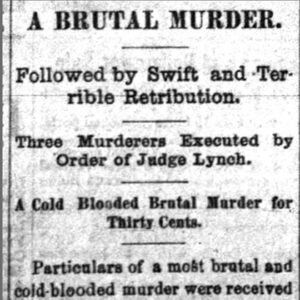calsfoundation@cals.org
Sevier County Lynching of 1881
In late May 1881, three African-American men were lynched in Sevier County for allegedly attacking a man who requested their help in crossing Rolling Fork Creek.
The descriptions of the victim are confusing. The Arkansas Gazette described him as “an old man named Holly.” The St. Paul Globe reported that he was a prominent Sevier County farmer named R. F. Hall; the Memphis Daily Appeal concurred, adding that he was eccentric. The Nebraska Advertiser gave his name as A. F. Hall. In his “Early Days in Sevier County,” W. S. Ray wrote that he was a “simple-minded man named Hall” who was passing through the county. Public records do nothing to clarify his identity. His alleged attackers were not identified in any of the reports.
The earliest known report of the incident appeared in the Memphis Daily Appeal on June 9. It was a brief account, indicating that R. F. Hall had been murdered by three African Americans whom he had hired to ferry him across the swollen Rolling Fork Creek. Learning of the crime, local white citizens captured the men and hanged them from a tree on the bank of the creek. On June 10, the St. Paul Daily Globe elaborated, saying that the crime had occurred near Lockesburg (Sevier County). Hall had started traveling to a neighboring county to visit friends. The Globe noted that he was known to carry large amounts of money. While he was making arrangements with three men to cross the Rolling Fork, “they suddenly sprang on the unfortunate man and felled him to earth.” They found only thirty cents in Hall’s pockets.
The Gazette published a report of the incident on June 14, noting that it had occurred almost three weeks earlier. According to the Gazette’s account, the incident happened near Ultima Thule (Sevier County), located on the eastern side of the present-day border between Arkansas and Oklahoma. Holly (Hall) encountered three African-American men and a boy near the river. They began to tease and kick him, eventually forcing him to wade into the creek “as long as he could without drowning.” They then let him leave the creek and forced him to “get down and pray.” He was then kicked some more and forced to wade back into the creek. Fearing that Holly would report them to authorities, they killed him and threw his body into the water. The body was soon discovered.
The boy who was one of the alleged perpetrators told his father about the incident, and his father made him report it in hopes that the boy would avoid being lynched. The three other alleged perpetrators were captured and hanged. The Gazette declared that “we are not in favor of lynch law, yet there are times when there should be no chance of escape allowed those who willfully perpetrate such hellish deeds as the one above referred to.”
For additional information:
“Crimes and Casualties.” St. Paul Daily Globe, June 10, 1881, p. 1.
“Little Rock: Three Negro Murderers Lynched.” Memphis Daily Appeal, June 9, 1881, p. 1
“Miscellaneous.” Nebraska Advertiser, June 23, 1881, p. 1.
Ray, W. S. “Early Days in Sevier County.” Publications of the Arkansas Historical Association, 1917, p. 170. Available online at http://genealogytrails.com/ark/historybook5.html (accessed October 13, 2020).
“That Horrid Murder in Sevier County.” Arkansas Gazette, June 14, 1881, p. 2.
Nancy Snell Griffith
Davidson, North Carolina
 Civil Rights and Social Change
Civil Rights and Social Change Post-Reconstruction through the Gilded Age, 1875 through 1900
Post-Reconstruction through the Gilded Age, 1875 through 1900 Sevier County Lynching Article
Sevier County Lynching Article 




Comments
No comments on this entry yet.